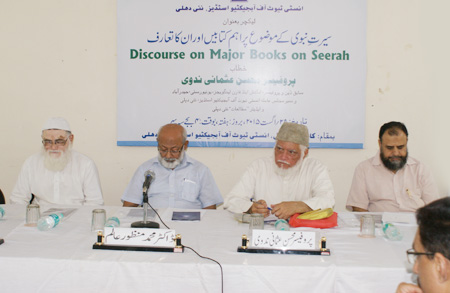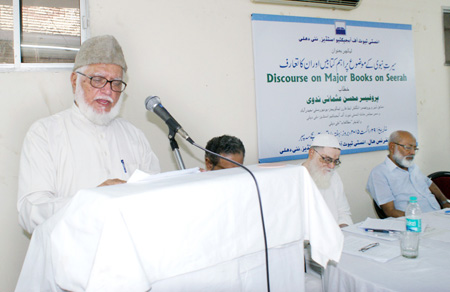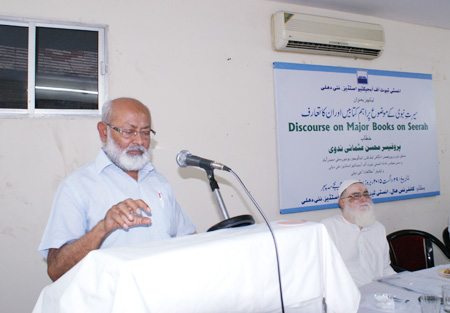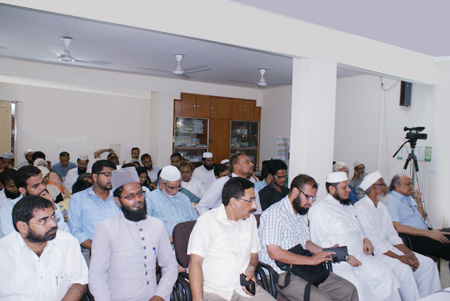IOS organises “Discourse on Major Books on Seerah”
August 29, 2015 at 162, Jogabai, Jamia Nagar, New Delhi

New Delhi, Aug. 29: “Discourse on Major Books on Seerah”, was organised by the Institute of Objective Studies at its conference hall here today. Former Dean, English and Foreign Languages University, Hyderabad, Prof. Mohsin Usmani Nadvi who delivered the lecture, held that the number of books profiling the life of the Prophet (Seerah) in various languages ran into thousands. This included a fairly good number of books written by non-Muslims. He said that during the times of the Caliphs (RA), the work on Seerah and the Hadith could not be taken up as the main concern then was to save verses of the Holy Quran by compiling them. Chroniclers concentrated on the life of the Prophet (SAW) only after they were sure that the compilation of the Quran was complete and there was no apprehension of duplication. Thus the work on the Seerah began about 150 years after the passing away of the Prophet (SAW).
He said that the main source of Seerah was the Quran which had some reference to the pre-Prophet (SAW) period, including the battles in which he participated and other events that threw light on certain incidents of his life. In this connection, he mentioned more than two dozen books and remarked that their authors penned them after thorough research and they were quoted as reliable books on the subject. He noted that the first such attempt was made by Hazrat Uroah bin Zubair, who was the son of the sister of Hazrat Ayesha Siddiqah (RA). While Hazrat Zubair collected material relating to Seerah, Aban bin Usman prepared an account on the subject. Another prominent name that figured in connection with the writing on Seerah was that of Mohammad ibn Muslim bin Shahab. Another chronicler named Mohd bin Ishaq, who was the disciple of Imam Zahri, wrote a book which was described as a derivative from the work of his teacher.

Prof. Usmani observed that it was Hazrat Moosa bin Oqba, who took upon himself the onus to sift the material and produce a book on Seerah. He said that Ibn Ishaq’s book was considered the first systematic work on Seerah, though in some circles it failed the test of authenticity. Referring to the books on Seerah produced in the Sub-continent, he mentioned names of Allama Shibli Nomani and Syed Suleiman Nadvi. While Shibli Nomani completed two volumes of the celebrated work Seerat-un-Nabi, the rest of the volumes were finished by Syed Suleiman Nadvi. Other noted scholars who carved out a niche for themselves as biographers of the Prophet (SAW) included Maulana Abdur-Rauf Danapuri, who wrote Asah-us-Sair, Quazi Suleiman Mansoorpuri Kandhalvi, who completed Rahmat-ul-lil Aalameen, Maulana Idris Kandhalvi, who penned Seerah-i-Mustafa and Maulana Manazir Ahsan Geelani, who produced Annabi-al-khatim. Besides, Naeem Siddiqui’s Mohsin-i-Insaaniyat, Maulana Syed Abul Hasan Ali Nadvi’s Aseerh-un-Nabooyah, Maulana Abul Aala Maududi’s book, Seerah-i-Sarwar-i-Alam, Dr. Mohammad Asif Kidwai’s Mulaquat-i-Seerah and Maulana Abdullah Abbas Nadvi’s Paighambar-i-Akhlaq wa Insaniyat, were some of the eminent works that attracted the attention of common readers as well as Islamic scholars.
Prof. Usmani maintained that the eminent litterateur and poet, Mahir-ul-Qadri, wrote Durre Yateem in the style of a novel. Prof. Yasin Mazhar Siddiqui’s book, Tanzeem-e-Riyasat wa Hukoomat-i-Nabawi based on the system of government during the Prophet’s times, Maulana Rabey Hasan Nadvi’s work Rahbar-i-Insaniyat and Maulana Wahiduddin Khan’s Paighambar-i-Inquilab were some of the popular books in Urdu. He said that Khutbat-i-Bahawalpur, a series of lectures by Dr. Hameedullah was a milestone in the literature on Seerah. Though most of the literature on Seerah in English was translation from Arabic and Urdu, original books were also written in English. These included Mohammad Husain Haikal’s book Life of Mohammad and Dr Mohammad Hameedullah’s books, The Battlefield of the Prophet Mohammad, The Emergence of Islam and The Constitution of Mohammad Rasoolullah, he said.

The Chairman of the IOS, Dr. Mohammad Manzoor Alam, who presided over the session, remarked that the responsibility to acquaint the younger generation with the Islamic teachings had devolved on us. It would be possible only when we follow the path shown by Prophet Mohammad (SAW). He said that the IOS, too, was engaged in the job and a project had been put in place. He pleaded for reaching out to the depressed, deprived weaker sections and the minorities, who constituted 60 percent of the country’s population for the propagation of Islamic teachings. Commenting on the misgivings on the status of women in Islam, he said that such charges must be countered by putting the record straight in the light of the Quran and Hadith. He informed that a “discourse on non-Muslim” works on Seerah was being actively considered by the IOS.

While the proceedings were conducted by Maulana Khalid Husain Nadvi, convener of the IOS Centre for Arabic and Islamic Studies, the gathering listened to the lecture with rapt attention. The session which began with the recitation of a Quranic verse by Hafiz Athar Husain Nadvi was attended, among others, by Professor of Law, Guru Gobind Singh Indraprastha University, Prof. M. Afzal Wani, Professor of Geography, JMI, Prof. Haseena Hashia, Mohammad Owais, Zafar Sadiq, advocate, Saleem Ahmed, Safdar Ali Nadvi, Chaudhary Wahaj Ahmad, Mohammad Tanzeem Alam, A.R. Shaheen Qasmi, Dr. Mohammad Hanif Khan Shastri, Mahboob Toa, Waseem Ahmed, Habibullah Khan, Mohammad Qasim Adil Nadvi, Syed Ashraf Rizvi, Safi Akhtar, Dr. Bismil Arifi and Asrar Jamai. A number of women were also present.
|